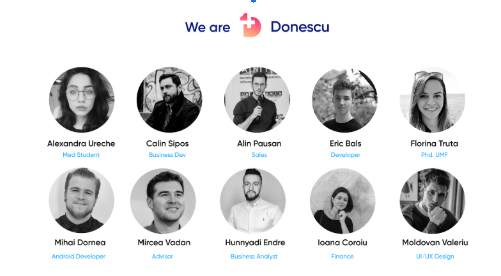How a Romanian project plans to aid fundraising for public hospitals



We have talked to the people behind the Donescu project about the challenges of getting centralized data about the local hospitals' needs and how they want to develop the project even after the COVID-19 pandemic will be over.
At the end of April, the project of the Donescu platform won in the "Enable crowd to help financially" challenge of the Digital Finance section of the #EUvsVirus hackathon, an event aimed at identifying the best solutions to support the European and global in the fight against the coronavirus outbreak.
Developed by a team from Cluj-Napoca, in western Romania, Donescu proposes a marketplace-type donation platform that facilitates the matchmaking of hospital equipment needs to the suppliers and donors.
The solution is meant to smooth the donation process and make it fully transparent. The donors can see a centralized list of hospitals' needs they can choose from and track the donation process with the help of a dedicated feature. The equipment providers are assessed upon registering on the platform to avoid the risk of fraud.
The idea for the platform emerged from the work that members of the team did during the coronavirus crisis, volunteering to help hospitals in Cluj-Napoca. Ioana Coroiu, a member of the Donescu team who works with the Rotary Visio Cluj NGO, was involved this March in gathering donations and distributing them to hospitals in Cluj.
The process was not without its challenges. Significant funding was raised, but there was no consolidated and updated list of the hospitals' equipment needs. Local lists were published on various social media platforms but they weren't updated. The volunteers contacted the doctors and, after identifying the institutions' needs, wanted to donate the funds, to allow hospitals to make the acquisitions using their network of approved providers. But hospitals are required to make purchases using the public acquisitions platform, where payment terms were of ten days (down from the 60 days usually foreseen in a normal, non-pandemic period). In their turn, providers were faced with liquidity issues and were requesting down-payments of up to 50% of the value of the equipment. A blockage ensued, even though the hospitals had the funds to purchase the needed supplies.
The members of Rotary Visio decided to purchase themselves the equipment for the hospitals but were faced with another set of challenges. They needed to select and contact medical providers, pick the equipment, and take management of the entire acquisition and transport process, from transport documents to approvals for the transport of biocides.
Rotary Visio Cluj supported with donations of medical equipment the Sebeș Infectious Diseases Hospital, the Cluj Regional Transfusions Center, the Cluj Family Physicians Associations, the Cluj Recovery Hospital, the Cluj Pediatrics Hospital 2, the Regional Institute for Gastroenterology and Hepatology in Cluj, and the Cluj Emergency County Hospital.
It was a lengthy process, but it also provided the idea for the Donescu project.

The team of the project is currently contacting partners to develop the platform, which they plan to pilot initially in Cluj county. The date of the launch depends on the number of partners that can be attracted to the platform and on securing the financing that would ensure the sustainability of the project in its first phase, Calin Sipos of Donescu told Romania-insider.com. The project needs around EUR 60,000 to be sustainable in its first year.
The hospitals and providers registering on the platform will only be visible after they are checked and approved. The team will check that the contact person provided for the respective hospital works for that institution, while providers will be checked that they are solvent, have the required certifications to distribute, and sell medical equipment, and that the contact person provided is employed there.
"Given the Covid-19 crisis, the focus is on the hospitals treating coronavirus cases, especially that other cases are expected. After the pandemic, we will target all hospitals and institutions that lack various equipment," Sipos explains.
Donescu, which currently has the model of an NGO, aims to build "a community of dedicated and responsible people who can contribute to supporting the public healthcare system in Romania, deprived of the medical and protective equipment it needs for its activity."
Once the platform is functional, the team plans to develop the crowdfunding solution that would allow significant funds to be raised for more expensive equipment and replicate it in other countries confronted with similar problems related to the underfunding of the public health care system.
(Photo: Jannoon028 | Dreamstime.com)
editor@romania-insider.com